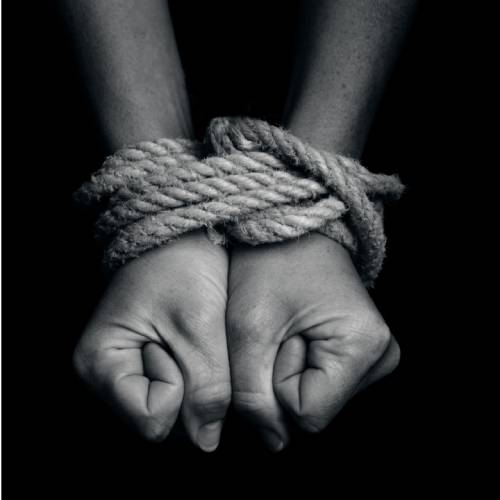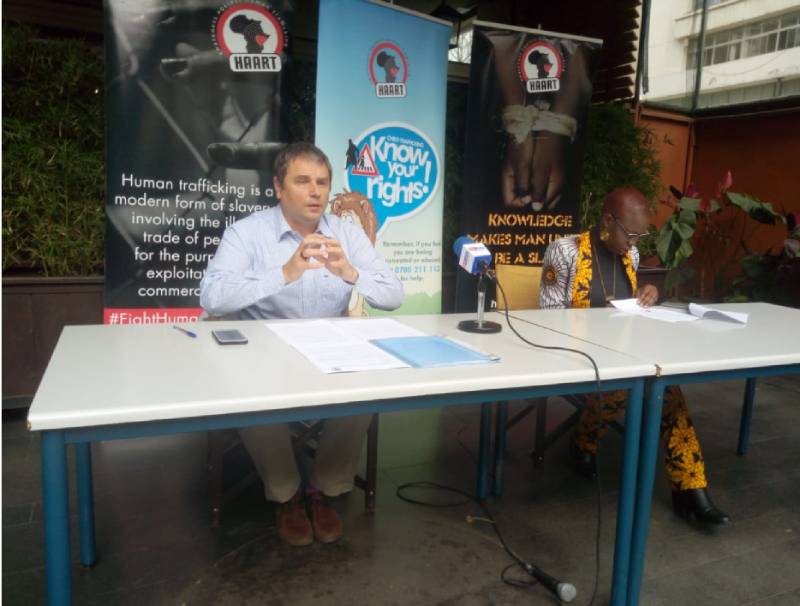
It is a paradox that human trafficking is still a concern in the 21st century.
According to the latest report by the Awareness Against Human Trafficking (HAART), the female gender seems to still be the most affected by human trafficking crimes.
“We analyzed data from a total of 586 victims of human trafficking supported by the organization since 2013, and among those, 85 per cent were female and 15 per cent were male,” said Radoslav Malinowski, the CEO of HAART.

The report that has been produced in marking the World Day against Trafficking in Persons, has also stated that 86 percent of the total cases were from Kenyan citizens and the rest from foreigners found to have been trafficked into the country.
The report has also intimated that the foreigners come from Nepal, Uganda, Tanzania, DRC, Burundi, India, Rwanda, Ethiopia, Eritrea, Cameroon, South Sudan, and Pakistan.
42 per cent of the victims mentioned Kenya as the country of exploitation and 25 percent mentioned Saudi Arabia. The rest of the victims mentioned other countries like Libya, Qatar, Lebanon, and Dubai among others.
This comes as the Covid-19 pandemic continues to ravage the world. The situation driving many into the precipice of abject poverty.
The crisis now becoming one of the key factors used as a bait to lure people into the entanglement of human trafficking.
Thousands of Kenyans have been laid off, others sent on unpaid leave, while millions have had to survive on pay cuts.
Recently, the Kenya Airways has sent parking hundreds of its staff in efforts to remain afloat. Other multi-nationals have also had to lay off employees to avoid closing shop.
“A decision has been reached to carry out an organization-wide rightsizing exercise which will result in a reduction of our network, our assets, and our staff. Effectively, we have commenced a phased staff rationalization process, which we expect to conclude by September 30, 2020,” noted KQ CEO Allan Kilavuka.
The HAART CEO says the search for survival has been the main recipe for the current cases, the majority going unreported.
“Many people have fallen victim to human trafficking in their quest to look for jobs and earn a living. The coronavirus pandemic is majorly to blame for the levels of poverty in the country,” stated Radoslav.
Stay informed. Subscribe to our newsletter
According to the Kenya National Bureau of Statistics (KNBS), the informal sector accounts for 83 percent of the labor force.
Most of the workers in the informal sector operate under a high level of informality and vulnerability, resulting in small and unpredictable incomes, poor working conditions, and low productivity.
The organization also revealed that poverty, is the main reason for human trafficking, with 87% of the victims trying to flee poverty. Majority of the victims coming from informal settlements.
Many people have also fallen prey to sexual exploitation, forced labor, and forced marriages among others.
Further, there are also emerging, new day exploitations. The digital platforms, becoming the new dungeon of slavery as victims are forced to pornography and other forms of sexual offenses.
Similarly, the concerns over sexual offenses has also caught the eye of the international organizations.
According to the United Nations Office on Drugs and Crime, children have been singularly been at high risk of sexual crimes, especially after schools were closed across the country.
“Children are at heightened risk of exploitation, especially since school closures have not only precluded many from access to education but also from the main source of shelter and nourishment. Since their schools are closed, many children are increasingly online for learning and socializing. This may make them more vulnerable to online sexual predators,” said a UNODC statement.
This comes after about 15 million learners in Primary and Secondary schools have remained at home since schools were closed in March following the Covid-19 pandemic.
The National Centre for Missing and Exploited Children (NCMEC) has also produced a report recording over 106 per cent global rise in reports of suspected child sexual exploitation – an increase from 983,734 last year, March to 2,027,520 one year later.
Due to the Covid-19 pandemic, the day is currently being marked virtually. The event is being led by the Ministry of Labour and Social Protection and the Counter-Trafficking in Persons advisory committee.
 The Standard Group Plc is a
multi-media organization with investments in media platforms spanning newspaper
print operations, television, radio broadcasting, digital and online services. The
Standard Group is recognized as a leading multi-media house in Kenya with a key
influence in matters of national and international interest.
The Standard Group Plc is a
multi-media organization with investments in media platforms spanning newspaper
print operations, television, radio broadcasting, digital and online services. The
Standard Group is recognized as a leading multi-media house in Kenya with a key
influence in matters of national and international interest.
 The Standard Group Plc is a
multi-media organization with investments in media platforms spanning newspaper
print operations, television, radio broadcasting, digital and online services. The
Standard Group is recognized as a leading multi-media house in Kenya with a key
influence in matters of national and international interest.
The Standard Group Plc is a
multi-media organization with investments in media platforms spanning newspaper
print operations, television, radio broadcasting, digital and online services. The
Standard Group is recognized as a leading multi-media house in Kenya with a key
influence in matters of national and international interest.











